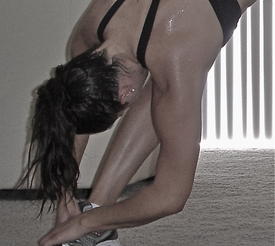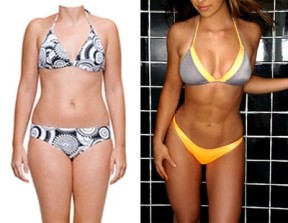Should I stop lifting?
Options

iwantniceabs
Posts: 357 Member
I am trying to lose 8 or 9 pounds in the next 6 to 8 weeks to drop a weight class for boxing. For the past two weeks, I have been eating healthy, and staying around 1200/1500 net calories, weight lifting 2 or 3 days a week, and running 3 miles 3 or 4 days a week (along with 4 days of boxing drills). I have GAINED 2 lbs. It is SO FRUSTRATING. Does anyone have advice on how I can lose?? Do I need to temporarily stop lifting? Do more running? Eat less??
0
Replies
-
Err laxatives and rolling yourself in a gym mat? =P
I kid.0 -
Oops, didn't mean to kill the thread =/0
-
Oops, didn't mean to kill the thread =/
Damn you!! You blew it up!0 -
Weight lifting does not make you gain fat, so why would you stop doing it?0
-
I understand you want a scale number change for the weight class you are trying to match, but if you have started lifting recently, a scale change going up a bit is normal, and expected.
The real question is "what have you gained?"
Most likely you are simply seeing water and glycogen storage in your muscle - this IS GOOD.
Have your inch measurements changed?
Scale weight alone when used to measure your progress will goof you up every time especially when lifting. Usually you will see the scale start to dip again, after a few weeks, but it may or may not move fast enough for your specific situation - if you must meet certain "numbers" in a short time.
I guess you need to decide what is most important at the moment - the "number" or the body changes, and improvement, you will experience from lifting? What are you more willing to sacrifice for now?
I will paste an article below from Chalene Johnson which explains "new lifting plan and weight gain". - But want to add, do not use the scaleas your only guide to progress and improvement.
I lift heavy weights, and have lost pounds and inches. But on the scale I weigh "heavy" by that I mean - last time I was at the weight I am now (age 16 in high school) I was 118-120 pounds, size 7. I am now a size 7 and weight 139-141 pounds.(age 47)
I Look tighter, smaller. leaner, and firmer all over then i did in high school at the same clothing size. But I now weight much more. Yet if you look at me I Look better all over.
Thats because the scale cannot accurately tell you what is fat, water, muscle or bone. Even scales that measure lean mass are not to accurate for many people. They always tell me I am way obese, and something like 30% bodyfat, which I am not.
So if you are looking for improvement alone - do not use the scale as your only guide - instead take measurements from many body areas every 30 days, and compare. Not all areas will change at the same rate but that's okay. As long as you are not getting larger (where you do not want to be) you are on track.
I often do not see a scale change for 30 days, but see inch changes, though maybe not in every area. And then one day, I lose 3-5 pounds at one time, and it stays gone. (actually I have been losing all along, but the scale just started to reflect that)Why the Scale Goes Up When You Start a New Workout Plan
By Chalene Johnson
Probably the most common question I get when I release a new exercise program is, "Help! I'm gaining weight! Am I doing something wrong?" This is a common phenomenon with any new exercise program, such as Turbo Kick, Turbo Jam, Hip Hop Hustle, or others! It's especially common (and temporary) with intense strength training programs like ChaLEAN Extreme or Tony Horton's P90X.
The motivation to start a new exercise program is almost always to lose weight. However, what most personal trainers know--and most at-home exercisers do not--is that a new exercise program often can cause an immediate (and temporary) increase on the scale. (Notice I didn't say weight gain! I'll explain.) This common increase in the scale is also the reason why perhaps millions of people start and then quickly quit their resolution to get fit.
The temporary weight gain explained:
When someone starts a new exercise program, they often experience muscle soreness. The more intense and "unfamiliar" the program, the more intense the muscle soreness. This soreness is most prevalent 24 to 48 hours after each workout. In the first few weeks of a new program, soreness is the body trying to "protect and defend" the effected or targeted tissue. Exercise physiologists refer to this as delayed-onset muscle soreness, or DOMS.
This type of soreness is thought to be caused by tissue breakdown or microscopic tears in muscle tissue. When this happens, the body protects the tissue. The muscle becomes inflamed and slightly swollen due to fluid retention. This temporary retention of fluid can result in a 3- to 4-pound weight gain within a few weeks of a new program. Keep in mind that muscle soreness is not necessarily a reflection of how hard you worked. In fact, some people feel no signs of muscle soreness, yet will experience the muscle protection mechanisms of water retention and slight swelling.
Most people are motivated enough to put up with this temporary muscle soreness. Yet, many, especially those who really need immediate weight loss to keep them motivated, become discouraged and quit!
When I worked with a group of 70 test participants during the development stages of ChaLEAN Extreme, this happened. Who was the most upset and discouraged? You guessed it... the women! I'm happy to report absolutely for every single woman (and man) in our group, the weight increase was temporary and never lasted more than two weeks before they started to see a major drop in the scale. However, these people had the advantage of working with someone who was able to explain to them why this was happening and assure them the weight would come off if they stuck to the nutrition plan and stayed true to the program.
If you follow a multi-phase exercise plan, such as ChaLEAN Extreme, keep in mind that when you start each phase, your body will be "in shock" again. Don't be surprised or discouraged if you experience a temporary gain on the scale the first week of each phase.
My own personal example of this is running 10Ks. I don't do it very often, maybe once or twice a year. Even though I run on a regular basis, when you run a race, you push much harder. It's natural for me to be insanely sore the next day. It�s also very common for me to see the scale jump 4 pounds the next day from forcing fluids post race and the resulting DOMS. Even though I know the cause of it, it's still a bummer. We're all human and hard work should mean results. Hard work equals results, but our bodies are amazing machines and they know how to protect us from hurting ourselves. Soreness forces you to give those muscles a break. Ultimately you will lose the weight and you will change your metabolism in the process.
The key is understanding that this is a normal and temporary and stick with the program!
When to be concerned:
If you experience a significant weight gain (exceeding 5 pounds) that does not begin to decrease rapidly after the second week, guess what it is? I'll give you one hint... you put it in your mouth and chew it. You know it! Your food (or calorie-laden beverages). News flash, friends exercise doesn't make you gain weight. Consuming more food than you burn makes you gain weight!
So if after two weeks you are not losing weight and have gained weight that's not coming off, it's time to take a close and honest look at your food intake. Start using SparkPeople's Nutrition Tracker regularly, and be honest.
Moral of the story:
Be patient young grass hopper. You'll be lean and mean in no time!0 -
also a recent post I made - but shows lots of pictures, that show how inaccurate scale weight is in determining body fat loss or changes.
The OP may know all this already, since she is liting and boxing, but can be helpful for others reading this thread also, in reference to "I started lifting and I'm gaining weight" thought process.Heres some pictures that may help you.
My results have been similar, I am 10-15 pounds heavier then my "rough goal weight" but am already AT my goal clothing size, and physically I am about 1-2 times smaller clothing wise, then last time I was at my goal weight (when I had less muscle) - So I look tighter leaner and smaller, then before at my "small" weight. (size 7/8)
So to everyone else I look like I am already at my goal weight. But I am scale weight heavier, which is fine Ignore the scale.
Ignore the scale.
Less weight - yep you will look good dressed and may fit the smaller clothing size - but, add more muscle and a bit more scale weight - you also fit the smaller clothing size, AND look good dressed AND look good nakkid. Thats a win-win
5 lbs heavier in after pic, but tighter and leaner
Not same girl, but cute example
Same weight, after was when she started lifting heavy
Different girls but both size 4
Same girl, before and after lifting heavy weights, she lost 5 lbs
Stacy, read her story here: She is 14 lbs heavier in after
http://nerdfitness.com/blog/2011/07/21/meet-staci-your-new-powerlifting-super-hero/
10 lbs heavier in after
10 lbs heavier in after
Different girl, but both size 2
5 pounds difference - big body change
Fat vs Muscle
 0
0 -
my cousin used to box professional. when he needed to drop weight to stay in his class he'd cut a bit of his calories, do more cardio (mainly running and a lot of easy cardio like walking his dog a few times a day for several miles total) and do shorter lifting sessions where he was lifting close to his max. basically you want to lose the weight to make the weight class without losing any of your strength since you'll need that power in the ring.
good luck!0
This discussion has been closed.
Categories
- All Categories
- 1.4M Health, Wellness and Goals
- 396.8K Introduce Yourself
- 44.2K Getting Started
- 260.9K Health and Weight Loss
- 176.3K Food and Nutrition
- 47.6K Recipes
- 232.8K Fitness and Exercise
- 451 Sleep, Mindfulness and Overall Wellness
- 6.5K Goal: Maintaining Weight
- 8.7K Goal: Gaining Weight and Body Building
- 153.3K Motivation and Support
- 8.3K Challenges
- 1.3K Debate Club
- 96.5K Chit-Chat
- 2.6K Fun and Games
- 4.5K MyFitnessPal Information
- 16 News and Announcements
- 18 MyFitnessPal Academy
- 1.4K Feature Suggestions and Ideas
- 3.1K MyFitnessPal Tech Support Questions



